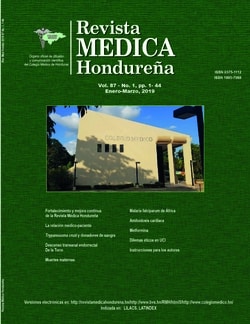Characterization and management of Trypanosoma cruzi seropositive donors, Blood Bank, Hospital Escuela, Tegucigalpa, 2016
DOI:
https://doi.org/10.5377/rmh.v87i1.11926Keywords:
Blood component transfusion, Chagas Disease, Transfusion medicine, Trypanosoma cruziAbstract
Background: The elimination of non-vector transmission of Trypanosoma cruzi is a national objective of public health. Seroprevalence in blood donors is target for elimination strategies for Chagas Disease. Objective: To characterize seropositive donors by T. cruzi and their management in the Blood Bank, Hospital Escuela, Tegucigalpa, 2016. Methodology: Cross-sectional descriptive study on a random sample of 150 blood donors, over 18 years old, selected from a sub-group of 726 seropositive by mandatory reporting diseases. The T. cruzi seropositive donors were invited to participate by telephone follow-up. Information on diagnosis, sociodemographic characteristics, notification, reference and follow-up was recorded. The protocol was approved by Facultad de Ciencias Médicas UNAH institutional review board. Results: Thirty T. cruzi seropositive cases were identified (20.0%, 95%CI 13.3- 26.7), average age 39.1 years, male 66.7% (20), coming from the center-south-east regions and low socioeconomic status. Of these 30 cases, 15 responded and agreed to participate; of these, 6 reported that they were notified about the serological result and 5 were referred for evaluation and treatment. Among these 5, in one case a second diagnostic test was performed. None was notified about their ability to donate blood. Conclusion: The cases identified are young adults, with a man to woman ratio of 2:1. It is necessary to implement a national registry system for notification and follow-up of the cases identified in blood banks. This system must be integrated into the surveillance system of the Honduras Secretary of Health.
Downloads
310




